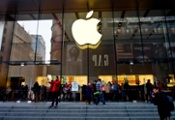2 min read
How International Trademark Laws Kept The "Apple Watch" Secret
![]() Brandon Selinsky
:
December 14, 2021
Brandon Selinsky
:
December 14, 2021

Over the past few months there have been many rumors and much speculation about Apple's new product releases. Two of those rumors, that new iPhones would include a much larger screen and the Apple would be launching a smart watch, turned out to be true.
September 9th was Apple's big reveal day for both products. What surprised some was the name of Apple's new watch.
Not an iWatch
Understandably, most consumers guessed that Apple's version of the smartwatch would be called iWatch. It both fit with Apple's typical naming convention and Apple fans had discovered that Apple had applied for a trademark application for the word iWatch in Japan just a year ago. However, Apple had a surprise for those who thought they had outsmarted the company. The name of Apple's smartwatch is Apple Watch.
When it comes to large unveilings like this one, Apple had to be somewhat secretive when it came down to what the exact name of their smartwatch would be. Don't forget that in order to have protection over a trademark in the United States, you must be the “first to file†to be able to have protectable rights.
Therefore, Apple Inc., had to make sure that they were one step ahead of the game and file for their trademark before another company or trademark troll registered it before them. As a result, Apple turned to a country that was miles away to register its trademark; it actually went all the way to two small islands named Trinidad and Tobago.
Secrecy and Trademark Protection
So how does this work? Are international trademark laws the same thing as U.S. laws? According to the Paris Convention for the Protection of Industrial Property, one of the first intellectual property treaties administered by the World Intellectual Property Organization (WIPO), a country is given a Priority Right if it files its trademark in a contracting country.
A priority right allows one country to file a trademark application in another contracting state and use this first filing date in all other contracting states provided that the applicant files a subsequent application within 6 months. In other words, Apple filed for its Apple Watch trademark in Trinidad and Tobago, a contracting country to the Paris Convention, on March 11th, 2014. By filing this application, so long as Apple filed another application in a different contracting state within six months, Apple would be able to use this March 11th, 2014 date as its filing date.
Remember again the importance of this filing date is that whoever files first, (generally) gets the trademark. In this case, by registering Apple Watch in Trinidad and Tobago, Apple essentially earned itself 6 months within which to file in the U.S. to gain protection under the March filing date. All in all, Apple's legal and corporate teams did an outstanding job of utilizing the law to their advantage to maintain both secrecy and trademark protection, two interests that are often at odds.
For more information regarding the Paris Convention, international trademark laws, or domestic trademarks, contact the lawyers at Whitcomb Law, P.C. today.



